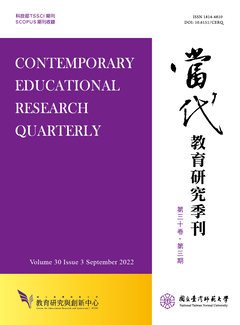

研究目的
在新型冠狀病毒COVID-19(Coronavirus Disease 2019)疫情的爆發下,線上學習改變了傳統的學習模式。本研究的目的是探索自我導向的學習策略和自我導向的學習態度,如何影響參與者對線上學習的網路認知疲乏和線上學習過程中全神貫注的感知情況,從而呈現出他們對線上學習其感知學習成效。
研究設計/方法/取徑
本研究採用便利取樣方式收集數據。在COVID-19 流行期間,目標參與者來自在中國封鎖區域採用遠距學習的高等學校學生。問卷透過騰訊問卷系統發布,供參與者填寫。有效地收集了155 名大學生的樣本數據,並利用Smart PLS 3.0 對其進行信效度分析和結構方程模型,以驗證本文提出的研究模型。
研究發現或結論
研究發現,自我導向的學習態度與線上學習認知疲乏程度呈負相關,但與線上學習全神貫注有正相關;自我導向的學習策略與線上學習認知疲乏呈負相關,而自我導向的學習策略與線上學習全神貫注則呈正相關。此外,線上學習認知疲乏與感知學習成效呈正相關,但是線上學習全神貫注與感知學習成效呈現負相關。
研究原創性/價值
在COVID-19 疫情流行威脅下的新學習模式,探索線上學習過程中學生的自主學習,其學習和網路認知疲乏之間的相互作用。雖然,沒有對影響學習成果看法的相關研究進行深入討論,但基於特質活化理論TAT(Trait activation theory),這項研究首先將自我學習分為兩類:策略和態度,並發現自我學習特徵如何預測線上學習的心智狀態,例如鈍化―認知疲勞和活化―全神貫注,影響在COVID-19疫情流行時線上學習的感知效果。
教育政策建議或實務意涵
研究結果將自我導向學習的方式分為策略和態度,並指出學校教師應該促進自主學習的策略和態度。此外,設計良好的遠程學習計劃以激發學生的精神狀態,積極學習和探索是必要的。教師在教學過程可以設計引用互動提示,促進學生之間進行良好互動,引發學習專注力,加強整體學習的效果。
Purpose
During the outbreak of the new coronavirus disease COVID-19 (Coronavirus Disease 2019) epidemic, online learning has changed the traditional learning model. The purpose of this research was to explore how the antecedent of self-directed learning approach and attitudes of online learning can affect participants’ perceptions of cognitive fatigue and immersion during online learning that reflect their perceptions of the learning ineffectiveness of online learning.
Design/methodology/approach
This research adopted convenience sampling to collect data. During the period of the COVID-19 epidemic, the target participants were higher education students who adopted distance learning in the lockdown area of China. A questionnaire was posted on the Tencent questionnaire system for participants to fill out. The sample data of 155 college students were validly collected and subjected to test reliability and structural equation modeling using the SmartPLS 3.0 software to verify the research model proposed in this study.
Findings/results
The study found that self-directed learning attitudes were negatively related to online learning cognitive fatigue, but were positively related to cognitive presence; the self-directed learning approach was negatively related to online learning cognitive fatigue, but was positively related to cognitive presence. Moreover, online learning cognitive fatigue was positively related to perceived learning ineffectiveness, whereas cognitive presence was negatively related to perceived learning ineffectiveness.
Originality/value
In the new learning mode under the threat of the COVID-19 epidemic, this study explored the interaction between students' selfdirected learning, focused learning, and cognitive fatigue during the online learning process. Although there is no in-depth discussion on related research that affects learners’ perception of their learning outcomes, based on TAT (Trait activation theory), this study first divided self-directed learning into two categories: approach and attitude, and found how self-directed learning traits can predict online learning mental state, such as deactivator-cognitive fatigue and activator–immersion that affected the perceived effectiveness of online learning during the COVID-19 epidemic.
Suggestions/implications
The results of this study divided self-directed learning into approach and attitudes and indicated that both approach and attitudes of self-directed learning should be promoted by school teachers. Moreover, to design good distance learning programs, it is necessary to stimulate students’ mental state to learn and explore actively. Teachers can design interactive prompts or a reminding service in the teaching process to promote students’ cognitive presence and reduce their Internet cognitive fatigue, and to strengthen the overall learning effect.

This work is licensed under a Creative Commons Attribution-NonCommercial 3.0 Taiwan License.
Center for Educational Research and Innovation, National Tawain Normal University
162, Ho-Ping East Rd, Sec. 1, Taipei, Taiwan | Tel:+886-2-7749-3670 | E-mail: cerecerq@gmail.com
CERI | NTNU | E-mail Alerts | Open Journal System
© 2014 CERI-NTNU
